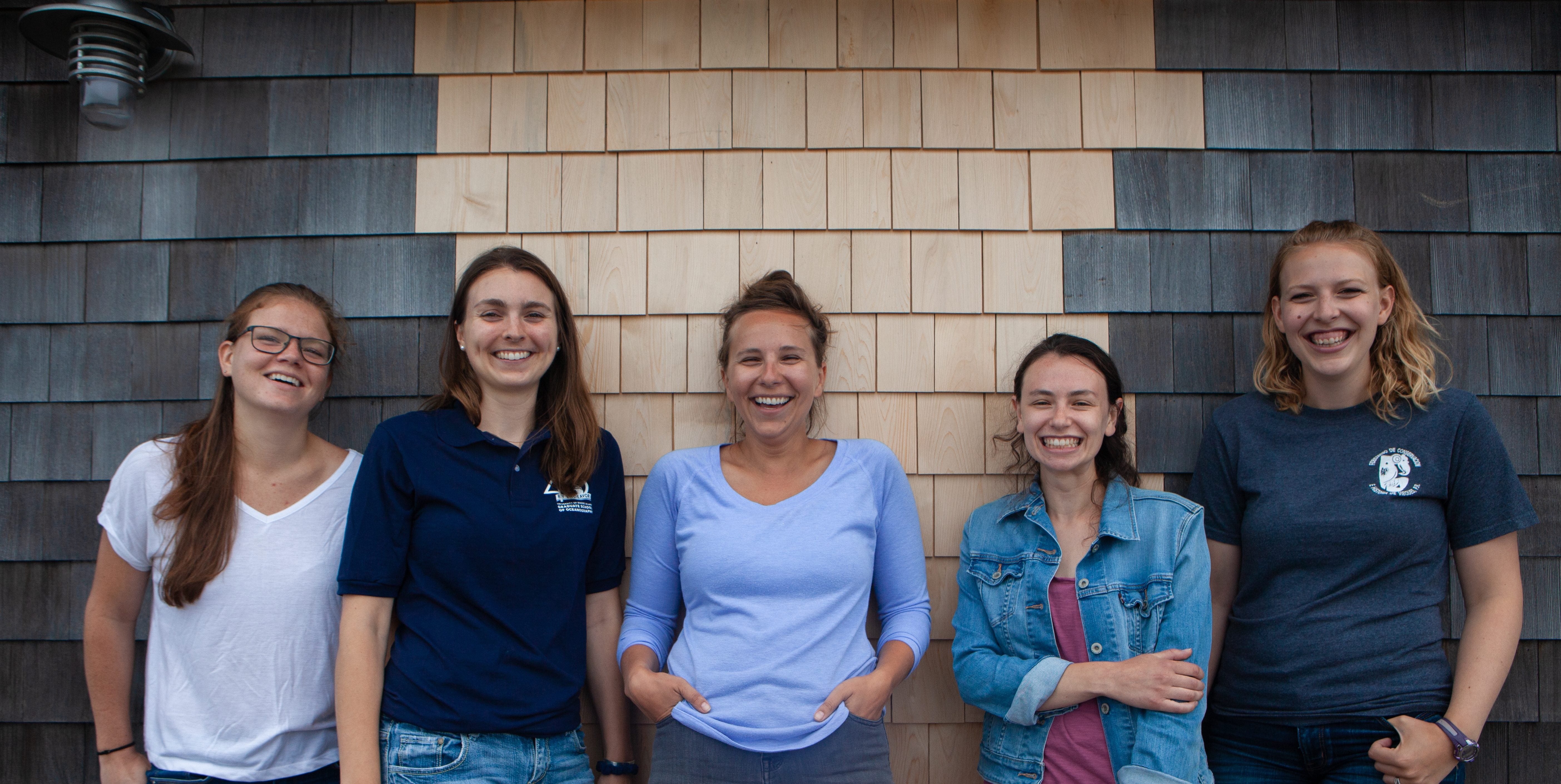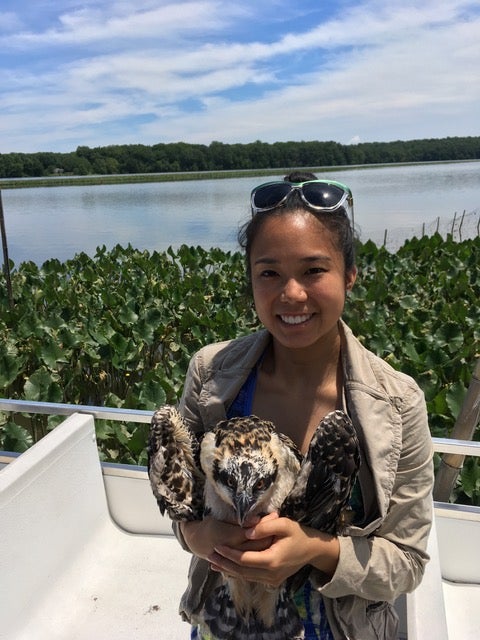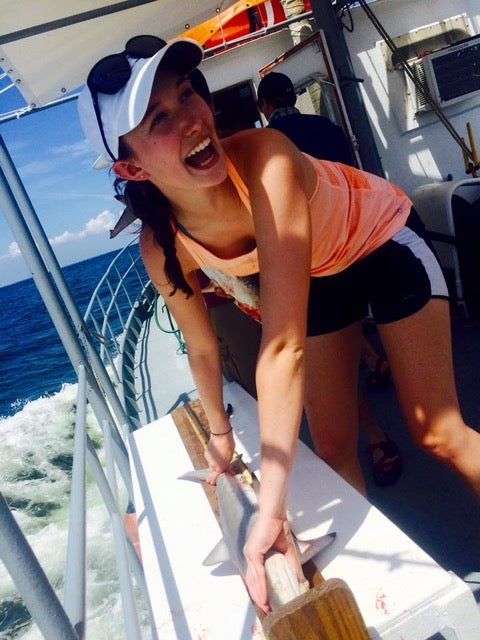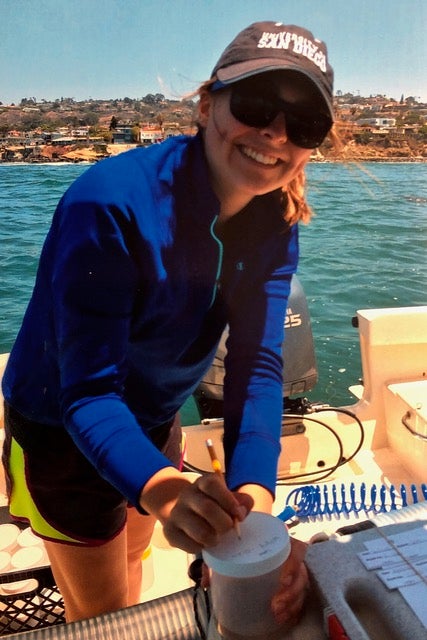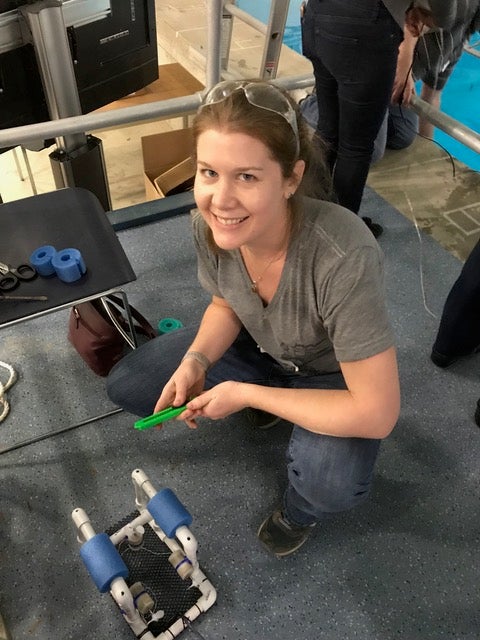Despite being the most prominent feature on Earth, the ocean is still a mystery in many ways. Some of the uncertainty surrounding the ocean is compounded by the scientific publishing process, as the body of peer-reviewed knowledge about the ocean often reaches only a tiny percentage of the public due to paywalled publication sites and indigestible technical writing.
The Origins of Oceanbites

Oceanbites was founded in 2013 by GSO alum Carrie McDonough (Ph.D. 2017). McDonough, now a faculty member at Stony Brook University, started oceanbites after meeting graduate students who ran astrobites.com, a site where astrophysics research is translated into jargon-free summaries.
McDonough realized that such a site for ocean science could be an important resource to better satisfy public curiosity about ocean exploration and research. She also felt it could raise public awareness about the crucial role our oceans play in keeping us healthy and the serious threats they face.
With those needs in mind, oceanbites.org was launched. The primary goal of the site was to teach people about oceanography, yet McDonough notes this has evolved over time. “During my time at GSO, I learned a lot about effective ways for scientists to engage with the public, and I learned that communication is not a one-way street. I think over time, the writers and admins [administrators] at oceanbites have started to look for ways to learn more about our readers and what they want to learn about.”
Writers who contribute to oceanbites from outside URI come from across the country and the globe, from universities including Scripps Institution of Oceanography, University of Southern California, University of Akureyri (Iceland), Columbia University, Florida State University, and the University of New Hampshire.
McDonough notes that the biggest challenge to launch and maintain the blog was and is drumming up interest—graduate students have plenty to do without extracurriculars, so it can be hard to find participants who can commit to writing. McDonough also notes that learning to delegate has been key to the success of oceanbites, saying “Help from others is the main reason oceanbites has continued to grow and remain productive over time.”
Oceanbites Today: Student Leadership at Work
McDonough has passed site management to an enthusiastic leadership team. She is now leading an effort to develop a “Science Bites” network, which will provide resources to students wanting to start their own “bites” site. She has also started a new bites site, envirobites, that focuses on communication of environmental science to public audiences, all in addition to her research exploring organic chemical pollution.
The current leadership team keeps the site running smoothly and works to expand the site’s reach. This team, led by current GSO Ph.D. candidate Anna Robuck and URI alum Rebecca Cray, is spread across multiple institutions and organizations across the country. The team primarily ensures daily operation of the site. One or two articles are posted per day, each written by a different author and edited by two peer editors. This system works via a carefully constructed writing and editing schedule; each author is assigned one writing day per month and two editing days, by turns acting in different roles to support site needs without requiring too much time on a daily basis.
Beyond maintaining the flow of content, the leadership team performs site upkeep, maintains a social media presence, curates an internal newsletter, and identifies ways to grow the site and provide more resources to the writers.
Yet the key to oceanbites’ success is an engaged writing team. The team consists of approximately 32 active members, all current graduate students, post-docs or early-career scientists in marine science. Oceanbites maintains a particularly strong presence at GSO, as 35% of the current team and 41% of alumni are GSO students.
Writers who contribute to oceanbites from outside URI come from across the country and the globe, from universities including Scripps Institution of Oceanography, University of Southern California, University of Akureyri (Iceland), Columbia University, Florida State University, and the University of New Hampshire. These authors find oceanbites via social-media advertising, job boards/listservs and academic networks.
The authors are not only diverse in their backgrounds and geographic locations, but also in what they choose to write about. Oceanbites accepts a flexible range of content, provided it is somehow connected to marine science. They tackle topics related to physical, chemical, geological and biological oceanography, marine biology, behavior, ecology, conservation biology, climate change and other anthropogenic disturbances, marine policy and more.
The website’s most-read features illustrate the broad range of topics it covers. One post about sea-star wasting disease ended up on Reddit and received over 10,000 visits in a matter of days. Other popular posts include one about lobster poop, a post about a DIY LED photometer, and a post about sea-ice radiation reflectance.
Oceanbites also hosts weekly posts called “Sharkbites Saturday” that highlight new and interesting research in the world of sharks and their relatives. These posts receive particularly high engagement, often garnering thousands of views per feature, and help inform the public about the many threats facing sharks today.
Oceanbites seeks to walk readers through ocean phenomena on all scales, the methods used to study them, and the relevance and complexity of the questions being asked.
Why all this emphasis on science communication?
Despite a diversity of content, oceanbites’ general focus remains on accessibility and bringing ocean science to the broader public. Oceanbites seeks to walk readers through ocean phenomena on all scales, the methods used to study them, and the relevance and complexity of the questions being asked. The team strives to ensure that readers not only grasp the basic concepts and challenges of the latest ocean science, but that they come away understanding its significance outside the world of research.
Oceanbites provides vital opportunities for early career scientists to learn communication skills. Budding ocean science researchers in mainly academic environments rarely find opportunities to communicate research to non-scientific audiences and frequently struggle to develop the ability to explain complex scientific ideas in simple terms for public audiences. Oceanbites meets this need by providing an opportunity for early-career scientists and graduate students to practice public-facing writing skills, learn new communication techniques, engage in peer-editing and publish articles on deadlines.
Oceanbites provides career development for those with a more ardent thirst for communication efforts. Many oceanbites authors hope to break into the field of science communication, or SciComm, and find that writing for oceanbites has given them the opportunity to broaden their perspectives on marine science as a whole while also building a SciComm portfolio. By covering a wide range of topics that affect different communities, our authors consistently ask themselves who they are trying to reach and why. This experience has proven valuable and formative for many, as oceanbites alum have become science communicators at Louisiana Universities Marine Consortium, Ecological Society of America, Massive Science, National Institutes of Health and beyond.
Oceanbites moving forward
There are challenges to operating as a virtual team and, moving forward, the oceanbites leadership team intends to address these challenges by first understanding them better. The team recently sent out an anonymous survey to authors and alums for feedback on the site and authorship experience to identify the needs of authors and the blog as a whole. Results so far suggest better editing and community mentorship will be key goals moving forward.
Leadership team member and URI alum Rebecca Cray puts it succinctly: “While we may not always know what other authors look like, we still gain a lot from our electronic correspondence. However, mentorship is a difficult task within a virtual structure of so many authors, so we’ll make that a higher priority and find creative solutions.”
Oceanbites is also growing via audio outlets and social media. To engage audience members on the go, oceanbites makes posts available for listening through a YouTube outlet called Oceanbites Out Loud. Oceanbites Out Loud varies in delivery, from summaries describing posts of similar topics to the reading of entire posts. The leadership team is also actively exploring creation of a podcast that would entail collaboration with sister bites sites.
Oceanbites maintains a significant social media presence, driving site views and disseminating oceanbites content to thousands. Oceanbites maintains a Twitter handle @OceanBites with over 20,000 followers, a Facebook page, and a newly revamped Instagram account highlighting authors’ research and visually promoting themes covered in oceanbites articles. The platforms enable oceanbites posts to reach diverse audiences and direct over 10,000 monthly visitors to the site.
This past spring, oceanbites leadership team member and GSO Ph.D. candidate Nyla Husain hosted chats on Twitter centered around climate change to spread awareness and bolster engagement with our readership (#OBClimateChat). The three-week series engaged participants on topics related to the climate crisis and potential policy solutions. It was well-received and oceanbites is excited to continue hosting Twitter chats about a variety of topics to give readers real-time opportunities to ask questions and give their thoughts on the latest ocean research.
Above all, oceanbites plans to continue bringing ocean science to the wider public. “Our leadership and writing teams are so focused on the oceanbites mission—we are going strong over six years after the site was founded. I believe oceanbites will remain an important platform for ocean-science communication long after current authors and leaders move on,” says Editor-in-Chief Anna Robuck. As long as there is exciting ocean science to cover, you can expect oceanbites to persist with the support of engaged graduate students, appreciative alumni and communication-focused institutions like GSO.
This article was written by Nyla Hussain, Rebecca Cray and Anna Robuck, with support from the oceanbites leadership team.

